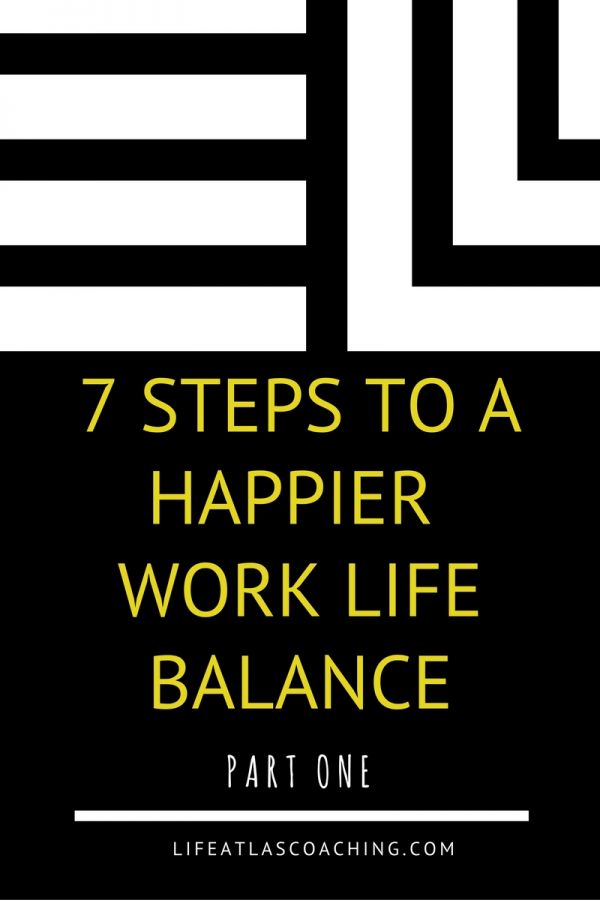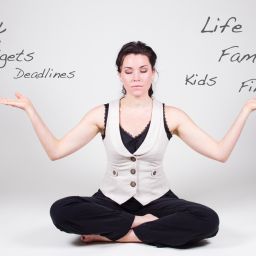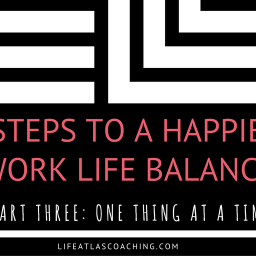
Recently, Life Atlas Coaching ran a survey of 270 working mums aged between 35 and 55, and found that more than two-thirds of those working full time were unhappy with their work-life balance. And of those that work part-time only half felt happy with their work-life balance.
Conclusion? Feeling you have a happy work-life balance is about a whole lot more than the amount of time you spend at work compared with time spent at home.
Put simply, work life balance isn’t just about the balance of how you spend your time, it’s about how you actually feel as a result of how you spend your time. So if you’ve been fiddling around making little changes here and there, trying to get more organised, maybe what’s needed is something a whole lot bigger, to really make a difference?
Of course, juggling a job, family, home and personal life does mean juggling your time like an expert, if you’re going to create the time you need to do all the things you want to do. And there’s the rub. Because even when you have time, you told me in the survey that you still don’t spend it on doing the things you really want to, because you feel too guilty to do so.
For now, we’re going to park the guilt-factor (if you can’t park it and want to get over it like NOW, come and do some work with me and we’ll tackle it head on!) and focus on the seven steps you need to take if you’re ever going to get your work-life balance in check and start to feel happier with your life.
I’ll blog one step each week for the next seven weeks rather than overwhelming you with all seven big ones in one go (because I know you’ve already got enough going on in your head). That means, if you’re feeling super-keen to start making a difference to your own work-life you’ve got a whole seven days each time to think about what you can do personally with each step.
And, perhaps surprisingly, none of them focuses directly on organising yourself better.
How many things do you do which feel pointless AND unimportant AND are unenjoyable? If you can’t tick any of those boxes then the task in hand is going to feel pretty draining.
And the more of these things you choose to do that give you absolutely nothing back, the more of your life you are going to spending feeling frustrated and unhappy…leading to a work-life balance that feels like you’re spending too much time wading through treacle.
And, when you have a crazy busy life with a million and one responsibilities, these are the times you start to resent for getting in the way of being able to do things that actually make you feel good.
Generally, when we’re doing things that feel worthwhile or that we enjoy, we feel happy. When we aren’t, we don’t. (If you want to read more about this, there’s a great book called “Happier” by Tal Ben-Shahar that talks all about why this is)
We always have a choice about whether we do something or not. OK, so the price we pay for not doing something might be pretty high and it might not be a price we’re wiling to pay…. so we do it. But that’s still a choice.
We’re in control of choosing what to do and, crucially, how we do it and yet we often choose to spend time doing things that give us an unhappy balance in our lives, when we could be taking greater control.
Whenever we make decisions about what we will or won’t do, about how we’ll spend our time and about how much of it we’ll spend on something, if we’re able to consciously guide our decisions using what we know about what’s truly important to us – our personal core values, we are able to choose better, and spend more of our time doing things that really matter, that make a positive difference to how we feel, and less time on things that don’t.
The result? We start to shift the needle on our work life balance.
First, whether we’re at work or at home, we open up the possibility of finding ways to achieve the things that must be done in a way that also feeds our soul, rather than leaving us feeling drained and frustrated by wasted time.
Second, we find it easier to decide what NOT to do, which creates time for the things we do want to do, and it becomes easier to say no to the things that will feel like a waste of time or which make us unhappy. We stop feeling we “should” do something, and recognise that the price we’ll pay for doing that is bigger than what we’ll gain.
And finally, it helps us be realistic and honest about what a good work-life balance looks like for us, what we need in our life in order to feel we’re truly thriving and happy, and that gives us permission to do some of the things we currently feel so guilty doing (I know I said I wouldn’t consider the guilt factor today, but hey, it still crept in there!) as well as being able to decide what not to do.
So just how do you go about defining these really important things (we coaches call them Core Values)?
Perhaps you’ve come across “values” in the workplace. Some companies live them better and more consistently than others. The ones that do, tend to have a well defined culture, and they guides the people that work there in terms of what is important about how they work and what they do and how and what, frankly, is not.
Values aren’t just for companies. As individuals, we all have our own personal core values too, whether we know what they are or not. When we are living and working and organising ourselves in a way that is totally in line with our values, we feel happiness. When we aren’t, we don’t.
There are probably scores of things that are important to you, that drive you to one extent or another and that give you great happiness when you are experiencing them. But understanding the really core five or six values you hold gives you a strong system to help you navigate through decisions, work and life much more clearly.
I know when I work with clients who’ve not considered this area before, they often find it life-changing (their words, not mine!), to truly reflect on and uncover the things that really, deep-down, matter to them so much that their lives and their work would be really unhappy without them. It has allowed them to recognise why they’re so unhappy at work (and what they can do about it), to make better decisions, to throw away guilt, to work out what they want to do with their careers, and turn around how they feel about their lives and specific things within it.
Although working directly with a coach like me is probably the easiest way of helping you uncover your personal core values, and comes with the benefit of making sure you’ve really considered all areas and have challenged yourself to think as deeply as you can about it, you can have a good stab at defining your core values by yourself.
- Ask yourself as many questions as you can that will allow you to think in depth about what really matters to you. Try to answer them as richly as you can, and think about what your answers really mean to you.
- From your answers, make a long-list of words or phrases that feel like they describe you and the things that drive who you are and how you make decisions.
- Then whittle that list right down (you’ll need to be ruthless!) to hit on your top five . A top tip to start that process is to try grouping things that are similar and see if you can come up with one word or phrase that encapsulates a number of different things.
I have a great set of questions that I use with clients that helps them think about why they make the decisions they make in their every day lives, and what really drives them. To get you started, here’s a few questions to consider. :
- What couldn’t you live without?
- What is going on and what things are at play in your life when you are feeling at your happiest and most fulfilled?
- What is going on (and, importantly, not going on) when you’re feeling unhappy and frustrated at life, or at work?
- What gets you out of bed in the morning?
- Why do you do the things you do?
- Why do you live where you live?
- What really frustrates you?
- Thinking about people you really admire, what qualities do they have?
- Thinking about people you really don’t admire, what qualities do they have and not have?
If you’re finding it difficult to pin your values right down, don’t for get you can always get in touch and have a chat about how we can work together on this in a much more personal (and enjoyable!) way.




